Part 2
Philip P. Eapen
OUTLINE
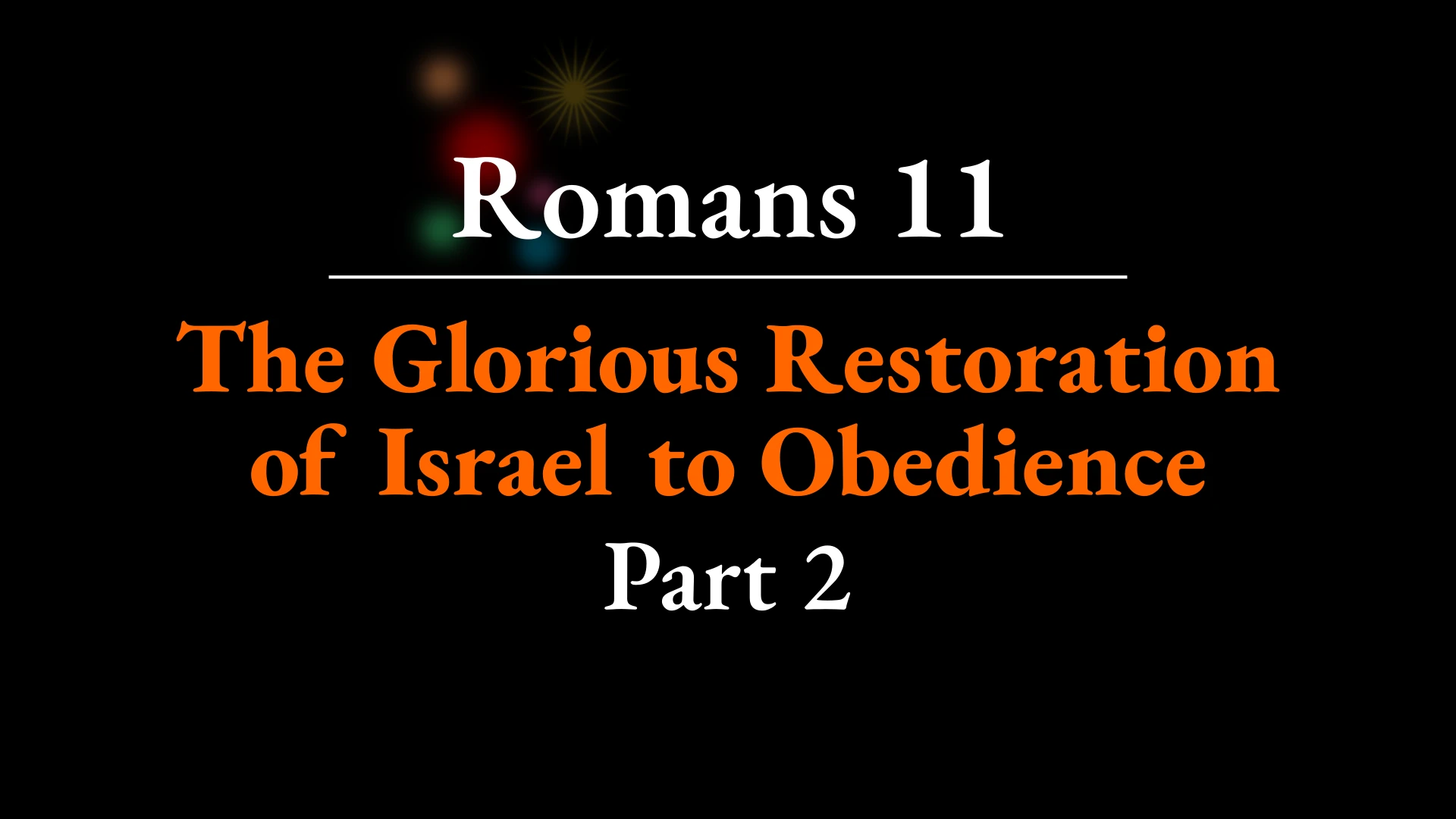
Today’s sermon is based on Romans 11. Last week, we had studied chapters 9 and 10 under the title “The Golden Age of Restoration of Israel.” That was part one. Today’s is part 2.
We shall do a quick review of Romans 9 and 10 before we examine chapter 11. In Romans 9 and 10, we saw Paul’s anguish.

Why was Paul sad? He knew that:
These statements were not postulates about something remote. These describe the spiritual state his own people, the Israelites. That is why it shook Paul to the core. He even volunteered to switch places with Israelites. He was willing to be cut off from Christ and go to eternal destruction if that could save the Israelites. Of course, we know that it must not be taken literally. Such a statement shows how deeply Paul was convinced that Jews without Jesus were lost.
Paul explored various plausible reasons for Israel’s failure. He concluded that Israel was responsible for her own failure.
There was no way anyone could blame the Torah (the Law) for Israel’s failure to believe in Jesus. The very goal of the Law was to lead Israel to faith in Jesus Christ. (Rom 10.4)
No one could blame God for being unfaithful to His covenant obligations. God remained righteous. He remained faithful. He sent His Son Jesus Christ because He was faithful to His covenants (Rom 10.3).
Faith was the only requirement to gain entry into a covenant relationship (“righteousness”) with God. Instead of submitting to God’s norm, Israel tried to establish her own norm based on national identity and religion (“the works of the law”). This prevented Israel from entering into God’s righteousness. It also prevented her from accepting the Gentiles who had been declared “righteous” through their faith.
We must not forget these ground realities as we approach Romans 11. Chapter 11 is a logical extension of chapters 9 and 10.
And, please remember that last Sunday I took you through several verses in Romans that says that, as far as salvation is concerned, there is no difference between Jews and Gentiles. God offers the same Gospel to everyone.
It is all too easy to forget the message of the first eight chapters of Romans when we read Romans 11. Please allow me to warn us: if we pluck Romans 11 out of its context, we will end up misinterpreting it. Romans 11 is one of the most abused chapters in the Bible. Let us proceed with caution.
1 So I
ask, has God abandoned his people?
Certainly not! I
myself am an Israelite, from the seed of Abraham and the tribe of
Benjamin. 2 God has not abandoned his
people; the ones he chose in advance. Don’t you know what the Bible
says in the passage about Elijah, describing how he pleads with God
against Israel? 3 ‘Lord,’ he says,
‘they have killed your prophets, they have thrown down your altars;
I’m the only one left, and they are trying to kill me!’ 4 But what is the reply from the divine word?
‘I have left for myself seven thousand men who have not bowed the knee
to Baal.’
5 In the same way, at the present time there is a remnant, chosen by grace. 6 But if it is by grace, it is no longer by works, otherwise grace would no longer be grace.
7 What then? Did Israel not obtain what it was looking for? Well, the chosen ones obtained it - but the rest were hardened, 8as the Bible says:
God gave them a spirit of stupor, eyes that wouldn’t see, and ears that wouldn’t hear, right down to this present day.
9And David says,
Let their table become a snare and a trap, and a stumbling-block and a punishment for them; 10let their eyes be darkened so that they can’t see, and make their backs bend low for ever.
11 So I
ask, then: Have they tripped up in such a way as to fall completely?
Certainly not! Rather, by their trespass, salvation has
come to the nations, in order to make them jealous. 12 If their trespass means riches for the
world, and their impoverishment means riches for the nations, how much
more will their fullness mean!
13 Now I
am speaking to you Gentiles.
Insofar as I am the apostle
of the Gentiles, I celebrate my particular ministry, 14so that, if possible, I can make my ‘flesh’
jealous, and save some of them. 15If
their casting away, you see, means reconciliation for the world, what
will their acceptance mean but life from the dead?
16 Take another illustration: if the first fruits are holy, so is the whole lump. And another: if the root is holy, so are the branches. 17 But if some of the branches were broken off, and you - a wild olive tree! - were grafted in among them, and came to share in the root of the olive with its rich sap, 18 don’t boast over the branches. If you do boast, remember this: it isn’t you that supports the root, but the root that supports you.
19 I know what you’ll say next: ‘Branches were broken off so that I could be grafted in.’ 20 That’s all very well. They were broken off because of unbelief—but you stand firm by faith. Don’t get big ideas about it; instead, be afraid. 21 After all, if God didn’t spare the natural branches, he certainly won’t spare you. 22 Note carefully, then, that God is both kind and severe. He is severe to those who have fallen, but he is kind to you, provided you continue in his kindness - otherwise you too will be cut off. 23 And they, too, if they do not remain in unbelief, will be grafted back in. God is able, you see, to graft them back in. 24 For if you were cut out of what is by nature a wild olive tree, and grafted, contrary to nature, into a cultivated olive tree, how much more will they, the natural branches, be grafted back into their own olive tree.
25 My dear brothers, you mustn’t get the wrong idea and think too much of yourselves. That is why I don’t want you to remain in ignorance of this mystery: a hardening has come for a time upon Israel, until the fullness of the nations comes in. 26 That is how ‘all Israel shall be saved’, as the Bible says:
The Deliverer will come from Sion, and will turn away ungodliness from Jacob. 27 And this will be my covenant with them, Whenever I take away their sins.
28 As regards the good news, they are enemies - for your sake! But as regards God’s choice they are beloved because of the patriarchs. 29 God’s gifts and God’s call, you see, cannot be undone. 30 For just as you were once disobedient to God, but now have received mercy through their disobedience, 31 so they have now disbelieved as well, in order that, through the mercy which has come your way, they too may now receive mercy. 32 For God has shut up all people in disobedience, so that he may have mercy upon all.
33 O, the depth of the riches
And
the wisdom and knowledge of God!
We cannot search his
judgments,
We cannot fathom his ways.
34For ‘who has known the mind of the
Lord?
Or who has given him counsel?
35Who has given a gift to him
Which
needs to be repaid?’
36For from
him, through him and to him are all things. Glory to him for ever!
Amen.
Here, in chapter eleven, the Apostle Paul concludes the topic he introduced in the previous two chapters. I see three main themes in this chapter.
Finally Paul closes the chapter with worship. He praises God for His ingenious way of letting both Israelites and the Gentiles know that salvation is a gift of grace. With that outburst of worship, this chapter comes to an end. Along with that, this doxology provides a fitting conclusion to the first part of Romans. In chapter 12, we find the beginning of a new section.
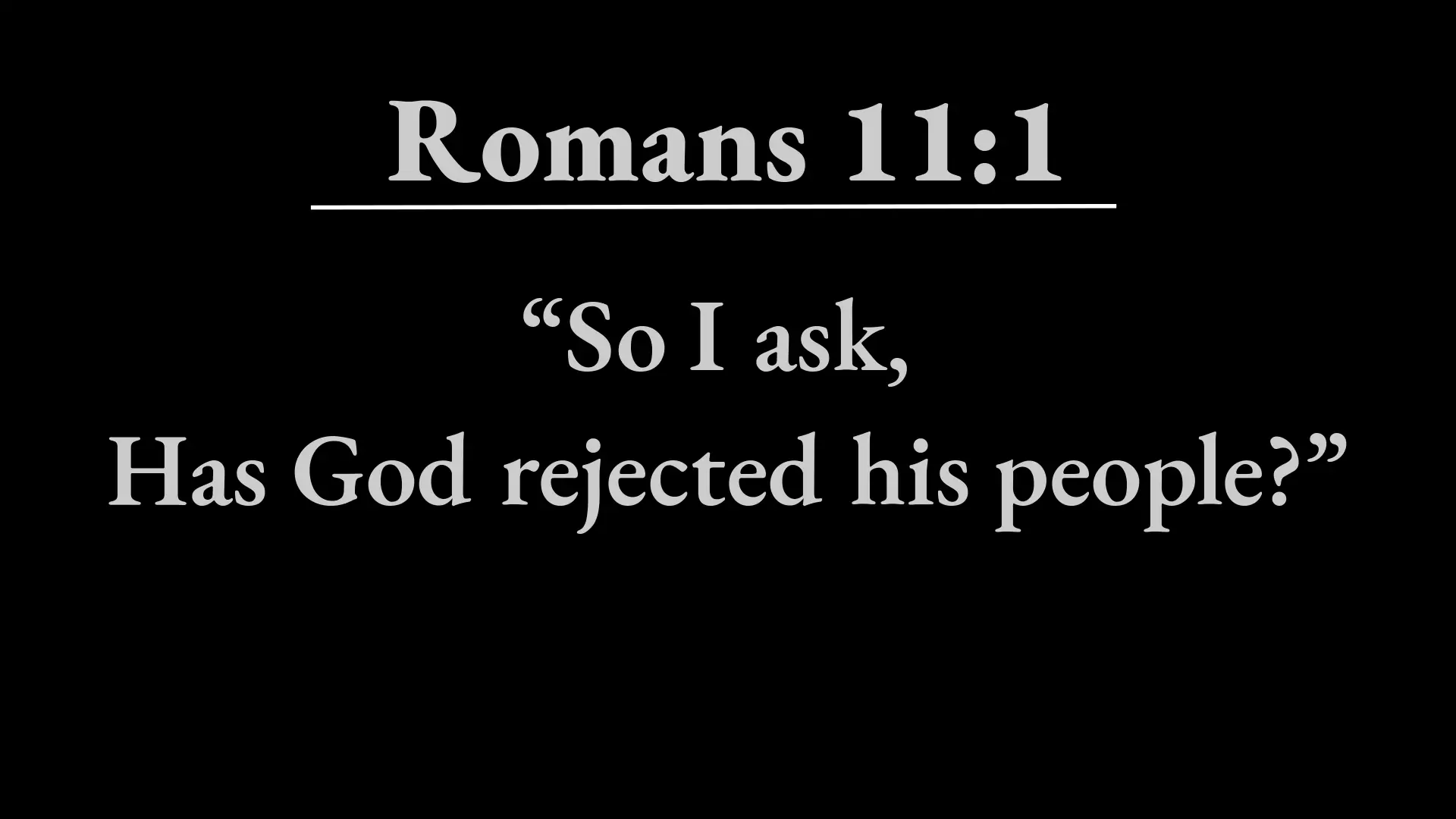
After having described the sad plight of the Israelites in the previous two chapters, it is only natural for Paul to ask this question.
v1 “So I ask, Has God rejected his people?”
In the Message version, the question is,
Does this mean, then, that God is so fed up with Israel that he’ll have nothing more to do with them?

Please bear in mind that this question was about all who belonged to the nation of Israel during Paul’s days. It includes both believers and unbelievers.
This entire body of Jews who were alive during the first century were themselves a tiny remnant of Israel that existed in all her glory during the reign of David or Solomon. If God had not spared a remnant, Israel would have been like Sodom or Gomorrah.
Back to the question: “Has God rejected his people?”
By now, we know how Paul answers such rhetorical questions in Romans. “Has God rejected his people?” Absolutely not! Μη Γενοιτω. (11:1)
How was Paul able to say that God has not abandoned ethnic Israel for good? To understand Paul’s response, we need to look at Israel through Paul’s eyes.

Paul saw ethnic Israelites as composed of two groups of people.
The “remnant” believed the Gospel. The “rest of Israel” rejected the Gospel.
The very fact that a “remant” among the ethnic Israelites believed Jesus Christ proves that God had not completely rejected his people.
That is Paul’s line of argument: In the second half of verse 1 and in verse two, Paul says, “God has not rejected ethnic Israel. For I too am an Israelite, a descendant of Abraham, from the tribe of Benjamin.”
Paul presented himself as the evidence of God’s continued work among ethnic Israel. He himself was an Israelite. If God had abandoned Israelites, would he have been able to become a follower of Jesus Christ? (v1-2)
Paul was not alone. He knew that there were thousands of Israelites who had believed in Messiah Ye’shua.
Paul was reminded of prophet Elijah’s times. Elijah once thought that he was the only one who remained in Israel as a worshipper of the true God. But God told him that that there were 7000 Israelites who had not bowed down before Baal. We can be sure that Paul took comfort from that story.
Similar to what happened during Elijah’s time, God had saved several thousands of Israelites through the Gospel. They were chosen by God to be a part of “the remnant.” (v5)

This “remnant” within ethnic Israel is the “real Israel.” This is the picture that should come to our minds when we read John 1:10-13.
He was in the world, and the world was created by him, but the world did not recognize him. He came to what was his own, but his own people did not receive him.
But to all who have received him - those who believe in his name – he has given the right to become God’s children – children not born by human parents or by human desire or a husband’s decision, but by God.
Those who are shown as “the Rest” in this diagram are the ones who were born merely by the desire of human parents. But the tiny “remnant” that received Jesus are the “children of God.”
Now that we know that this spiritual remnant is the group that followed Jesus, we can change their label in this diagram to “Disciples of Jesus.”

The spiritual Remnant in this diagram formed the nucleus of the Church of Jesus Christ. Jesus did not import the Church from outer space or from some other planet. His first followers were Jews. Paul calls them the “elect” or the “remnant”. It is through this spiritual remnant that God intended to fulfill his purposes.
What does the Bible call this remnant that follows Jesus Christ? We usually call them the New Testament Church or the Church of Jesus Christ. But here’s the real shocker. The Apostle called the Church by another name—I S R A E L.
Take a look at Galatians 6:15-16.

“It doesn’t matter whether we have been Jews or Gentiles. What counts is whether we have been transformed into a new creation. May God’s peace and mercy be upon all who live by this principle; they are the Israel of God.” – Gal 6:15-16.
But you might say, Wait a minute. My Bible does not say that.

Your Bible, in all probability might have rendered Galatians 6:16 as:
“And as for all who walk by this rule, peace and mercy be upon them, and upon the Israel of God.” – ESV
Such a translation makes it appears that God has two sets of people—the Church and ethnic Israel.
Such a translation goes against everything that Paul says in Galatians. It goes against the preceding verse which says, “It doesn’t matter whether we have been Jews or Gentiles.”
All this confusion is caused by the mistranslation of one tiny Greek word – και – which can be translated as “and” or as “even” (= that is). In this context, it has to be translated as “even”.
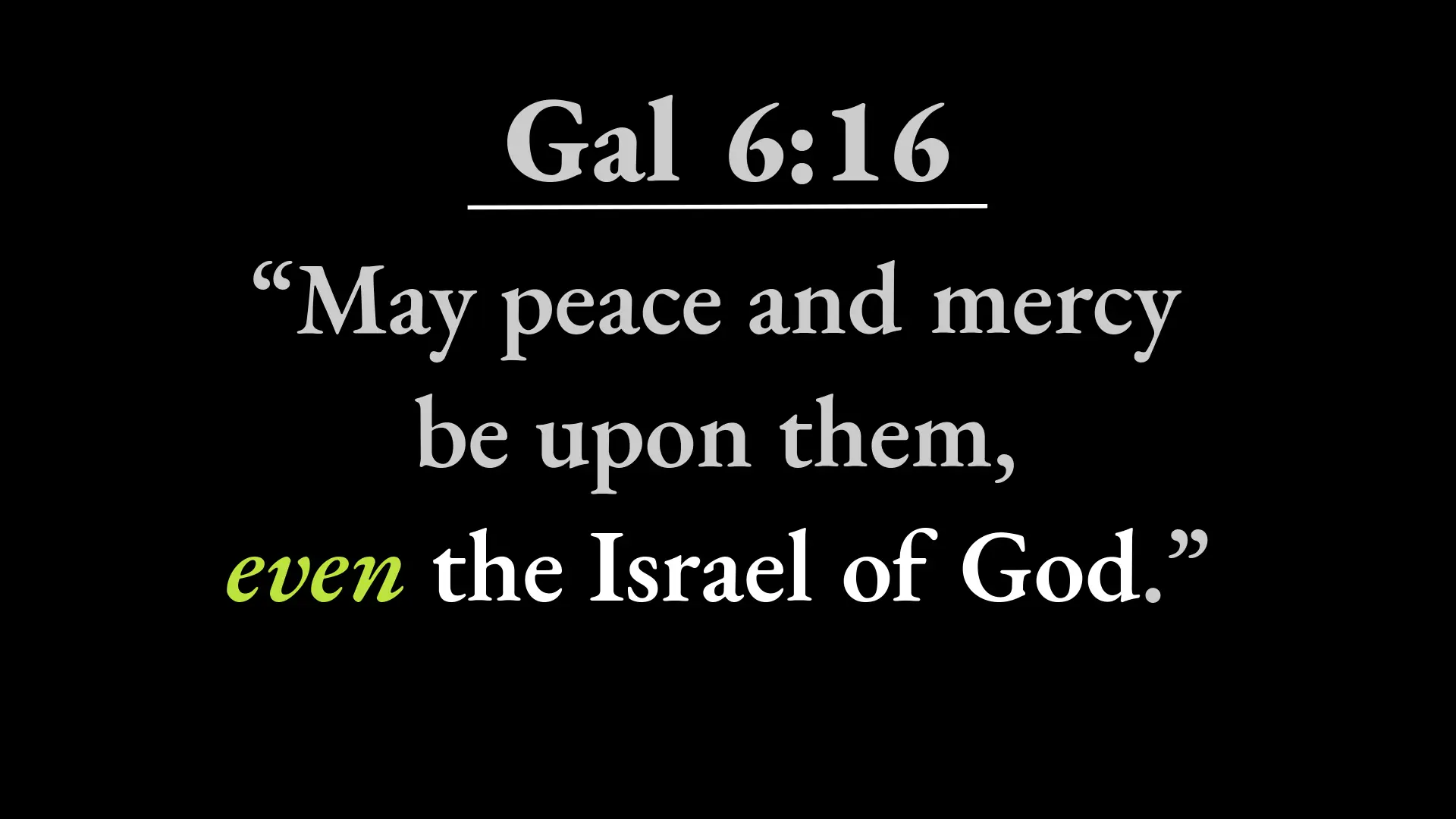
“And as for all who walk by this rule, peace and mercy be upon them, even, the Israel of God.”
Why do Bible translators deliberately mistranslate a verse even when they know that their action causes a contradiction in the text? It is because they subscribe to a dangerous framework of interpretation called Dispensationalism.
Due to time contraints I do not wish to explain this term now. This is the only thing I wish to say now: according to Dispensationalism, God has two sets of people—Israel and the Church. It is indeed sad that translators go to the extent of twisting the biblical the text to make it fit their favorite theological framework.
Paul is not the only one who referred to the Church as God’s Israel. If fact, Christians who lived in the first century knew that they were the true Israel. That is why when James wrote his epistle, he addressed it to the “twelve tribes of Israel.” (James 1:1) Obviously, James wrote his epistle to the Church. He called the Church “the twelve tribes of Israel” even though he knew that only three tribes of Israel were in existence at that time.

I have modified the previous diagram slightly to show the ethnic composition of the early church. The “elect” or the “remnant” among ethnic Israel that believed the Gospel is still represented by that yellow circle that sits inside the larger rectangle of ethnic Israel.
On the Day of Pentecost, the Church was entirely composed of believers from Jewish background. That’s why the circle of true Israel is completely inside the rectangle of ethnic Israel.

But as the years went by, God brought in Gentiles into this very body of “true Israel.” Here, we see that a minority among the “true Israel” came from a Gentile Background.
It is extremely important for us to understand that God did not start a new organization or a body for Gentile followers of Jesus. Both Jewish and Gentile followers of Jesus were integrated into the one new Man called the Church.
My point is, the nucleus of the Church was taken from among the Jews. But that nucleus expanded to include Christians from both Jewish and Gentile backgrounds.

Today, the composition of the Church is quite different. Most of the people within the circle of “true Israel” are from Gentile background. A tiny minority is from Jewish background.
Has God abandoned his people? Certainly not. That’s why we have Jewish Christians in the Church, which is the true Israel.
We move on to consider the second main question that Paul asks. What will happen to “rest of ethnic Israel”—the Israelites who refused to believe in Jesus? They are represented by the large rectangular area in this diagram.

Unlike the question in verse 1, this question not about the entire body of ethnic Israel. It is only about the fallen part of ethnic Israel.
“I ask then, did they stumble into an irrevocable fall?”
In other words, ethnic Israel stumbled and fell down. Is that end of the story? Will those Jews who rejected Jesus still have an opportunity to repent?
The answer is obvious. The door of salvation is still open to them. It is true that millions of Jews died in their sins. But Paul was talking about the Jews who were alive. At any given time, Jews have an opportunity to turn to the Lord Jesus Christ.
Last Sunday, I had displayed this diagram I had drawn.
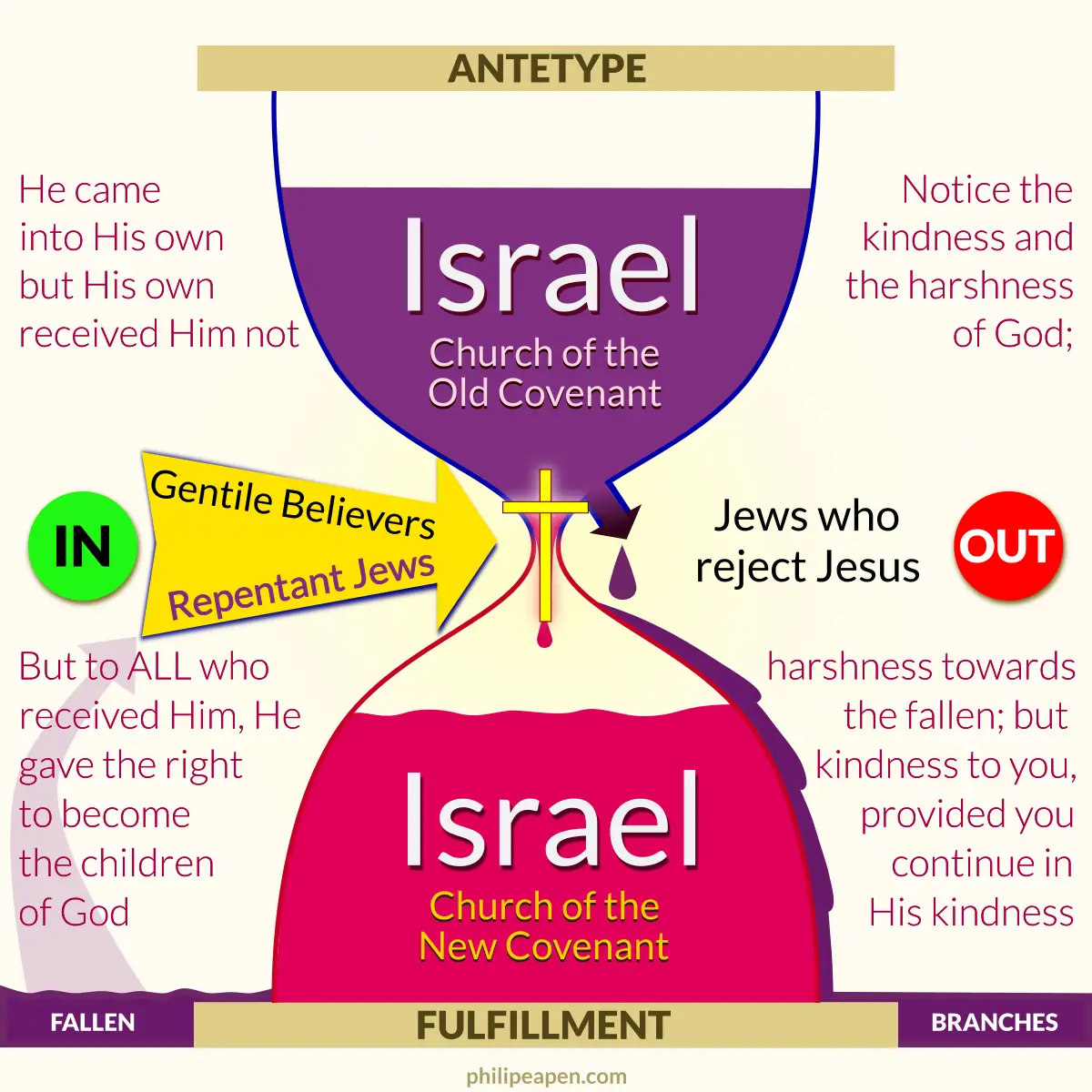
This diagram portrays the message of Romans 9, 10, and 11. I modified it slightly to include the message of Romans 11. I shall now take you through that diagram so that we understand what will happen to Fallen Ethnic Israel.

The upper part of this diagram shows Israel of the Old Covenant. It represents all of God’s people who lived before the Christ event. That includes Israelites and those who had converted to Judaism.

When Jesus arrived, the Jews faced a unique situation. There faced a bottleneck—a narrow strait they could not avoid. The spiritual fortunes of Israel depended on their response to Jesus.
Jesus, the Son of God, was like a large rock in their path. God had laid this rock in Zion. Most of the Jews stumbled on this rock. Some believed in Him.
If we should understand the significance of the choice the Jews faced, we must consider one of Jesus’s statements. Jesus once said to his disciples, I am the true Vine. Why did Jesus say that? Why did he not say, “I am the true coconut palm”? or “I am the true mango tree”?
Jesus was making a point there. There were already multiple references to the “vine” in the Hebrew Bible. In Psalm 80, we read about God planting a vine that He had brought from Egypt. That plant – the vine – represented Israel. In Isaiah 5, we read about God’s vineyard. But both Psalm 80 and Isaiah 5 describe God’s disappointment with Israel. She produced wild grapes instead of producing what her Master expected from her.
By claiming to be the true Vine, Jesus claimed to be the real Israel. Jesus was redefining Israel.
God was starting something new in and through Jesus. There was a continuity with the old Israel. But there was also a discontinuity. Jesus was starting a renewed version of the same Israel. Instead of choosing twelve patriarchs to start twelve new tribes, Jesus chose Twelve Apostles. He promised them that they would sit on twelve thrones and judge the twelve tribes of Israel.

To his 12 apostles Jesus said, “I am the vine and you are the branches. … If anyone does not remain in me, he is thrown out like a branch, and dries up; and such branches are gathered up and thrown into the fire, and are burned up.”
If Jews ever wanted to continue as God’s people, they had to attach themselves to Jesus, the true Vine. Jesus is the only Door to Life. He is the only way to Life. Apart from Jesus, there is nodivine blessing available to the Jew or to the Gentile.
This is not replacement theology. This is remnant theology, if you really need a name for it. Jesus was a Jew. His disciples were Jews. All Jews who believed in Jesus formed the true remnant of Israel.
Jews who refused to submit to the Lord Jesus got cut off from the covenant community. This diagram shows how they get flushed out of the God’s covenant community, God’s Israel. They are the “fallen branches” at the bottom of the diagram.
Let’s return to Paul’s second question in Romans 11:11.
“I ask then, did they stumble into an irrevocable fall? Absolutely not!” Do those Jews who rejected Jesus still have an opportunity to repent? Definitely.
But there is a condition. They have to repent of their sins and believe in the Lord Jesus, the Messiah. They have to come to the foot of the Cross and trust the One who died for them. The Bible does not offer two kinds of Gospel—one for the Gentile and another for the Jew. Gentiles entered the covenant community through repentance and faith. And that is exactly how sinful Jews must turn to God.
In the diagram, I have drawn an arrow from the lower left side to the cross. That represents the repentance of Jews who had formerly rejected Jesus. From their fallen state, they can turn to God.
There are Christians who think that God will offer a free pass to the Jews because they are descendants of Abraham. They will cite Romans 11:28-29.
“In regard to the gospel [the Jews] are enemies for your sake, but in regard to election they are dearly loved for the sake of the fathers. For the gifts and the call of God are irrevocable.”
It is true that God loves the descendants of Abraham. There is no doubt about that. They are beloved. God gave them gifts. God called them. But nowhere does the Bible say that the Jews will be allowed into the Kingdom of God just because they are descendants of Abraham!
Let’s remember what John the Baptizer said to certain Jews who came to him.
Don’t just say to each other, ‘We’re safe, for we are descendants of Abraham.’ That means nothing, for I tell you, God can create children of Abraham from these very stones.1
Paul gives us another beautiful illustration in Romans 11:17-24. It helps us understand the importance of faith and the danger of unbelief. It also teaches us to fear God who judges unbelief.
God’s covenant people are represented by an olive tree—a cultivated Olive tree of high quality. The patriarchs Abraham, Isaac, and Jacob and all the heroes of faith form the main trunk of the tree. The tree has many branches. Each individual member of God’s Israel is represented by a branch. Everything went well, more or less, until God sent His Son Ye’shua.
Every branch that rejected the Messiah was removed from the olive tree.
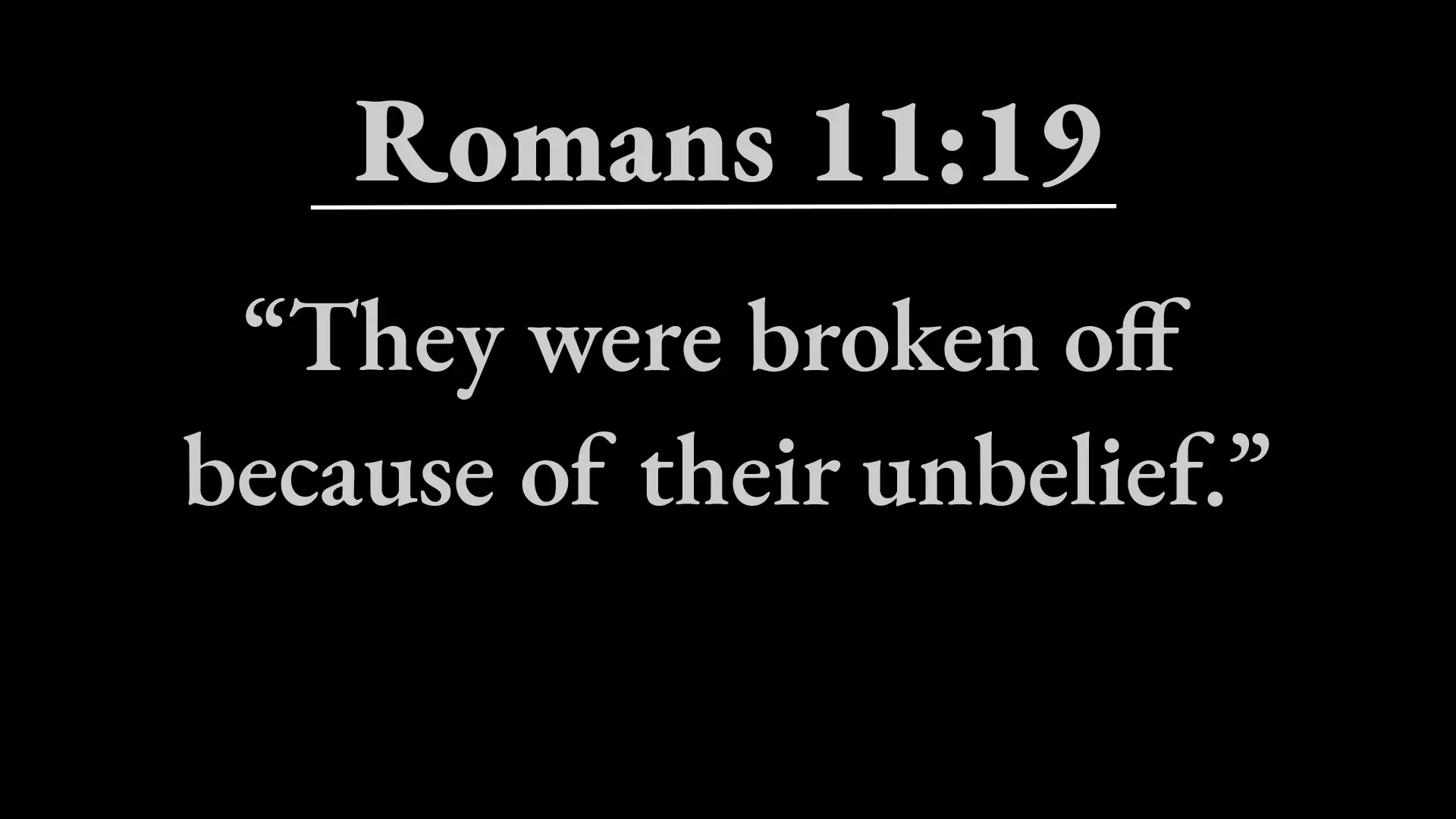
God was merciless towards them. Paul uses the word “severity” or “harshness.” Verse 22 says, Notice the harshness of God towards those who have fallen. Why were those Jews “broken off”?
Paul says, “They were broken off because of their unbelief.”
There was something good that came out of Jewish unbelief. Paul claims that their fall triggered God’s mercy towards the Gentiles.

God decided to accept any “branch” from any “wild olive tree” that was prepared to believe in His Son. These “branches” represent Gentile Christians. They were “grafted” into God’s cultivated olive tree.
As long as Gentile Christians are cautious and humble enough to retain their faith, they will remain attached to this olive tree. Verses 20-21 talk about this.

Faith in Christ is central. Faith is important not only for gaining entry into the Body of Christ but also for our continued fellowship with Christ.
Here, I must point out one important fact: The Greeks understood “faith” in terms of intellectual agreement. In English and in our native languages, we understand faith in a similar cognitive way. If we agree with a certain piece of information, we say that we believe it.
But the Hebrews understood faith in a different way. In Hebrew, the word for faith means faithfulness, firmness or steadfastness. Even when they spoke and wrote Greek or other languages, the Hebrew people understood faith in terms of Hebrew words for faith. It is highly probably that Paul carried with him a Hebrew mentality even though he wrote his epistles in Greek.
Considering the Hebrew meaning of faith, we can say that we must have faith in Christ and we must be faithful towards Christ. If Gentile Christians abandon their faith in Christ, that is, their faithfulness to Christ, they too can be removed from God’s olive tree. They can be cut off from Israel. That’s why Paul commands us in verses 20 and 21,
“You stand by faith. Do not be arrogant, but fear! For if God did not spare the natural branches, perhaps he will not spare you.”
Now that Gentiles are welcome to join the true Israel, what effect does that have on the fallen ethnic Israel? In the second half of verse 11, Paul says,
“by their [Jewish] transgression salvation has come to the Gentiles, to make Israel jealous.”
That answers Paul’s second question. There is hope for the Jews who rejected Jesus.
The hope here is that the Israelites who are fallen will turn jealous after observing the mercy that God showed the Gentiles. Paul hoped that the Jews would say, “If these Gentiles can enjoy the blessings that were meant for us, why don’t we get back to God through Ye’shua.”
Paul said that he magnifies his ministry to Gentiles, hopeing that his success in turning Gentiles to the Living God would provoke his people to jealousy. Through that, Paul hoped to lead some of fallen Israelites to Jesus.
“Seeing that I am an apostle to the Gentiles, I magnify my ministry, if somehow I could provoke my people to jealousy and save some of them.”
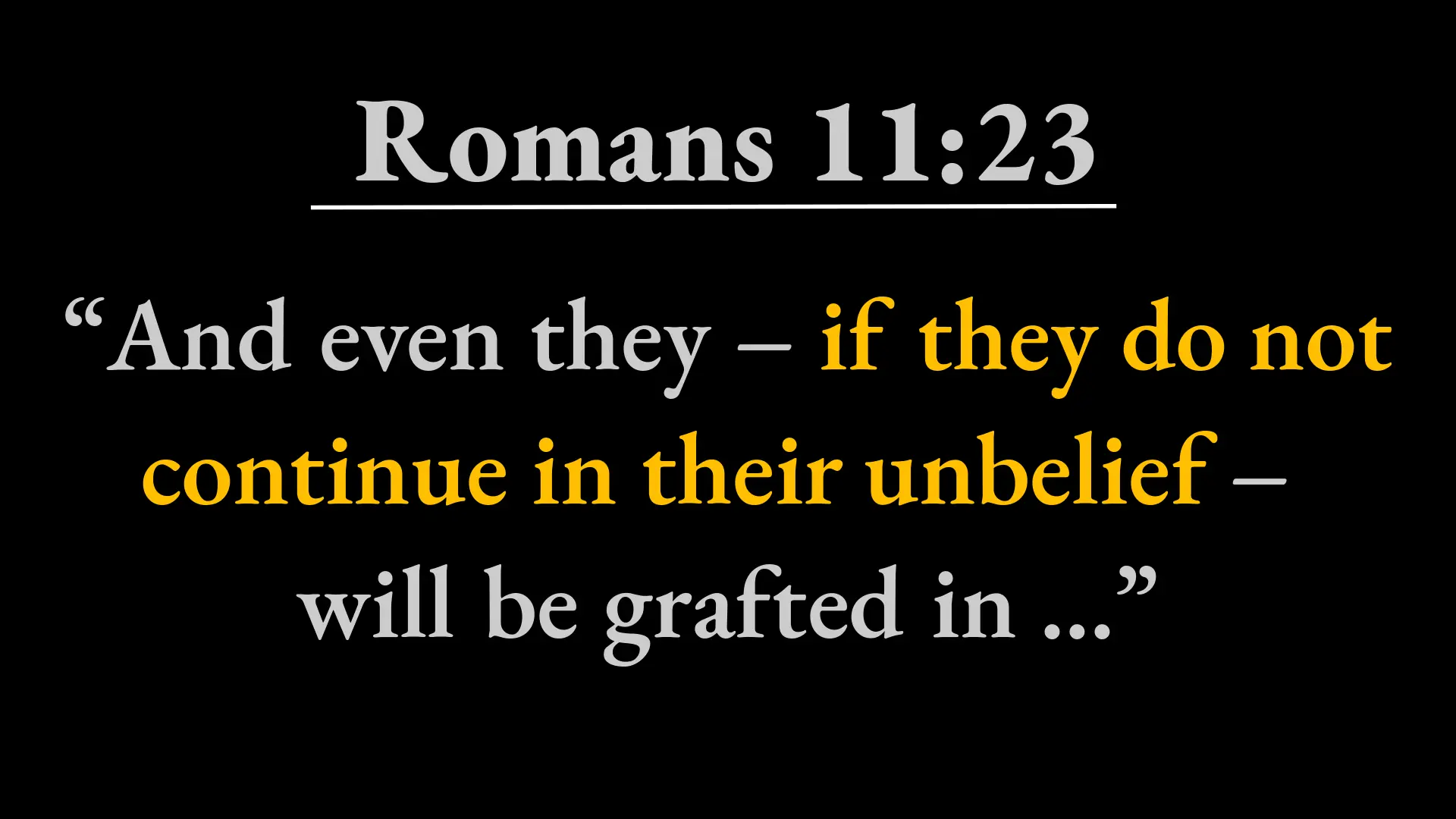
Even though they are like branches that lie strewn about all over the place, Jews who had once rejected Jesus can be grafted in—if they do not continue in their unbelief.
We should not think that one fine day, God is going to pick all those fallen branches and reattach those to their tree.
Faith in Jesus Christ is a necessary precondition to their restoration. “And even they—if they do not continue in their unbelief—will be grafted in, for God is able to graft them in again.” (v23)
Even as I say these things, I know that some of us may be eager to point out verses 25 and 26 to me. I shall read verses 25 through 27, and verse 30.
25 For I do not want you to be ignorant of this mystery, brothers and sisters, so that you may not be conceited: A partial hardening has happened to Israel until the full number of the Gentiles has come in. 26 And so all Israel will be saved, as it is written: “The Deliverer will come out of Zion; he will remove ungodliness from Jacob. 27 And this is my covenant with them, when I take away their sins.”
30Just as you were formerly disobedient to God, but have now received mercy due to their disobedience, 31 so they too have now been disobedient in order that, by the mercy shown to you, they too may now receive mercy.
When Paul uses the word “mystery,” we know he is talking about something that was kept hidden by God and was later revealed to him. In this case, it is definitely about the inclusion of Gentiles into the body of Israel.
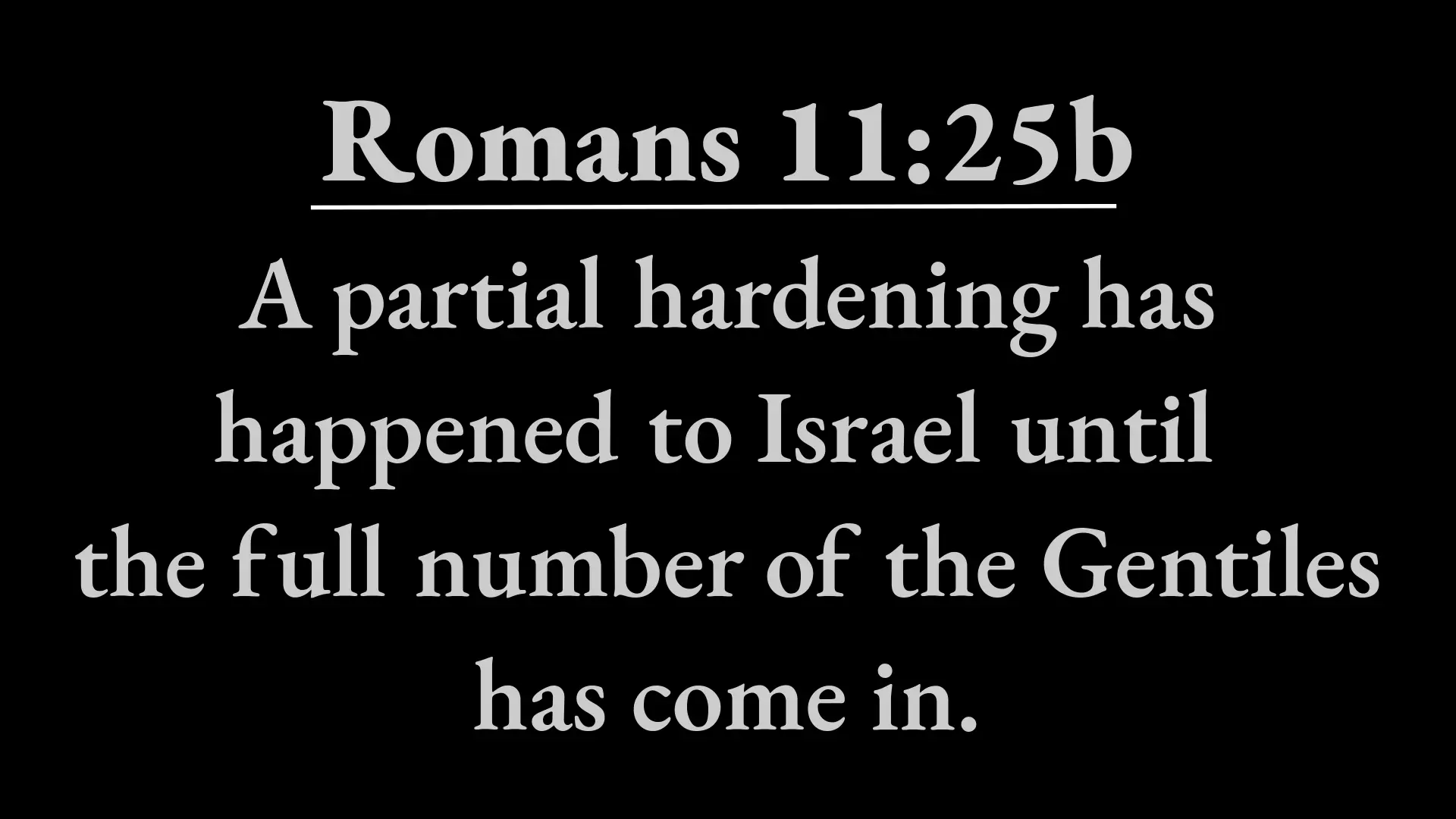
What Paul says here is interesting. Israel is experiencing a “partial hardening.” Most of them did not believe in Jesus. Some of them did. And, Paul seems to say that this “partial hardening” of Israel is temporary. Their spiritual blindness and hardness of heart will last until “the full number of the Gentiles has come in.”
Fifty percent of English Bibles translate this verse as “until the full number of the Gentiles has come in.” It gives us the impression that there is a predetermined number of Gentiles who will be saved. After that many Gentiles have come in, Israel will be set free from her sins and her ungodliness.
Has God indeed decided upon a number of Gentiles who should be saved?
The Greek word that is translated as “the full number” is pleroma. Pleroma is used seventeen times in the NT. Paul never uses the word in his epistles to refer to numeric fullness. The word pleroma means fullness. It does not refer to a number but to a relational status.
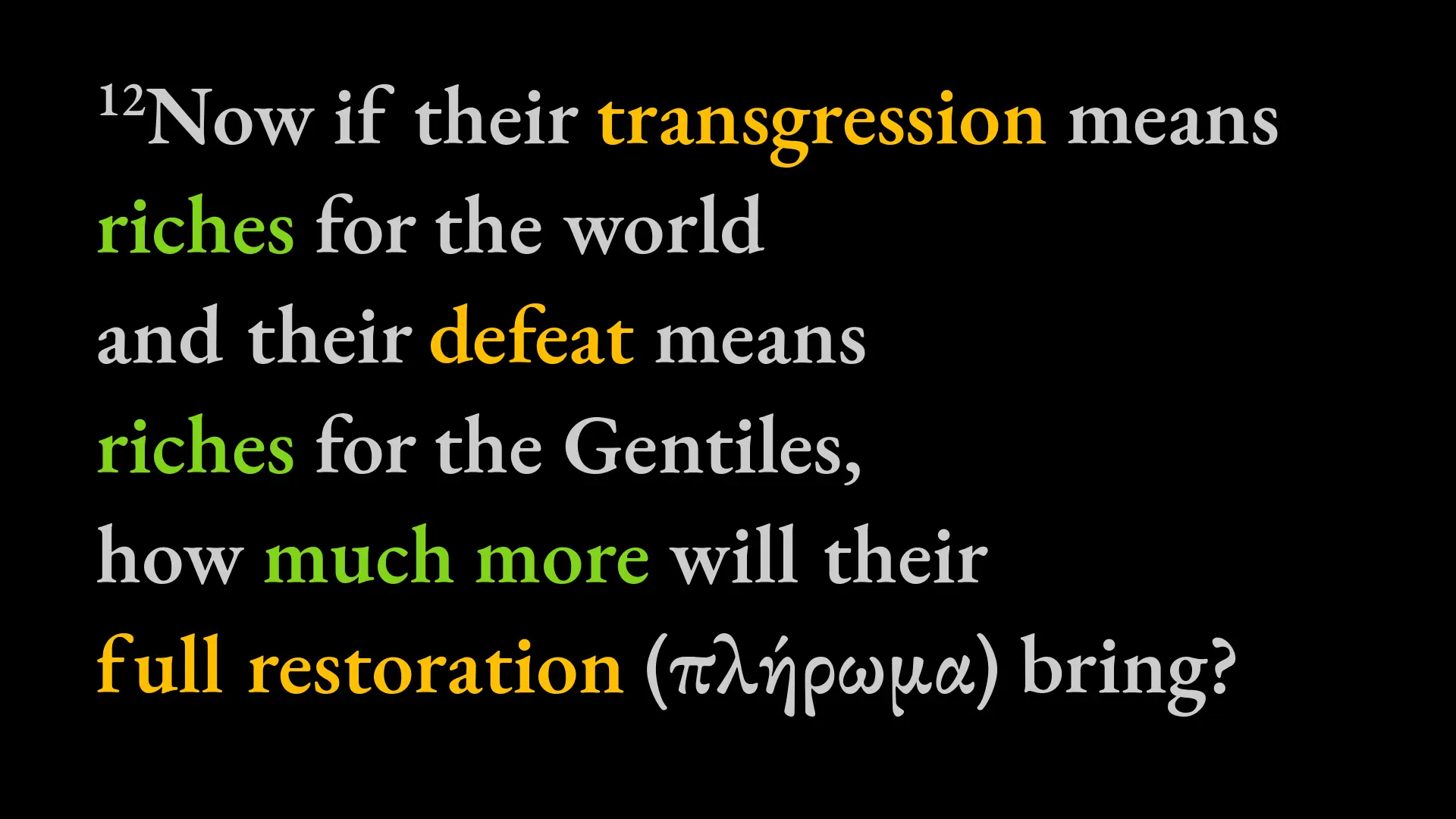
To illustrate this point, let us take a quick look at verse 12.
Now if their transgression means riches for the world and their defeat means riches for the Gentiles, how much more will their full restoration (πλήρωμα) bring?
The same word πλήρωμα is used here in verse 12. It is translated as full restoration.
Here, again, Paul is not talking about the full number of Jews getting restored. He is talking about restoration of fallen Israel to her initial state.
Please take a good look at this verse again. It says that the trangression of Israel brought “riches for the world.” We know what Paul is talking about. The “riches” refer to the opportunity of being included into Israel and thereby inheriting eternal life.
Just because Paul used the word “world” here, does it mean that the whole world has been saved? No! The opportunity to be saved was made available to the whole world. In the same way, the pleroma mentioned here is not about fullness of number but restoration into the fullness of a relationship.

We now return to verse 25 and 26.
A partial hardening has happened to Israel until the full restoration (pleroma) of the Gentiles will happen.
In this manner, all Israel will be saved …
So, we are told that after Gentiles experience a full restoration, “ALL ISRAEL” will be saved.
Verse 26 is the most abused verse in this chapter. Christians have come up with various interpretations.
For example, the dispensationalists will say, “Look, we already told you that God is not finished with Israel. He has a plan for Israel that is different from His plan for the Church. Once all the predetermined number of Gentiles are brought in, God will send Jesus to this earth and He will cause all Israel to be saved.”
When other Christians hear this, they panic. “How can that be?” they ask. How can the entire unbelieving Israelites be saved? This expression ‘all Israel’ must certainly be about the spiritual Israel or the remnant. This must be about the church.”
Actually, there is no need for any of us to panic. We have established beyond all doubt that faith in Jesus Christ is necessary for salvation—for Jews as well as for Gentiles. If God should send a deliverer from Zion and cause all Israel to be saved, He will not bend rules for Israel. Unless they believe in the Messiah, they will not be grafted back in. If all Israel will repent and believe in Jesus Christ, that is certainly a good thing.
But I don’t think that’s what Paul is saying here. If we take this expression “all Israel” literally, we will be forced to take this expression literally throughout the Bible.
For instance, in Acts 2:36, Peter says, “Let it be known to all the house of Israel that God has made this Jesus both Christ and Lord.”
There were several thousands of Jews gathered before him on the Day of Pentecost. But those thousands do not constitute the whole house of Israel. And yet, Peter used that phrase—not when he was drunk or sleepy. He was full of the Holy Spirit.
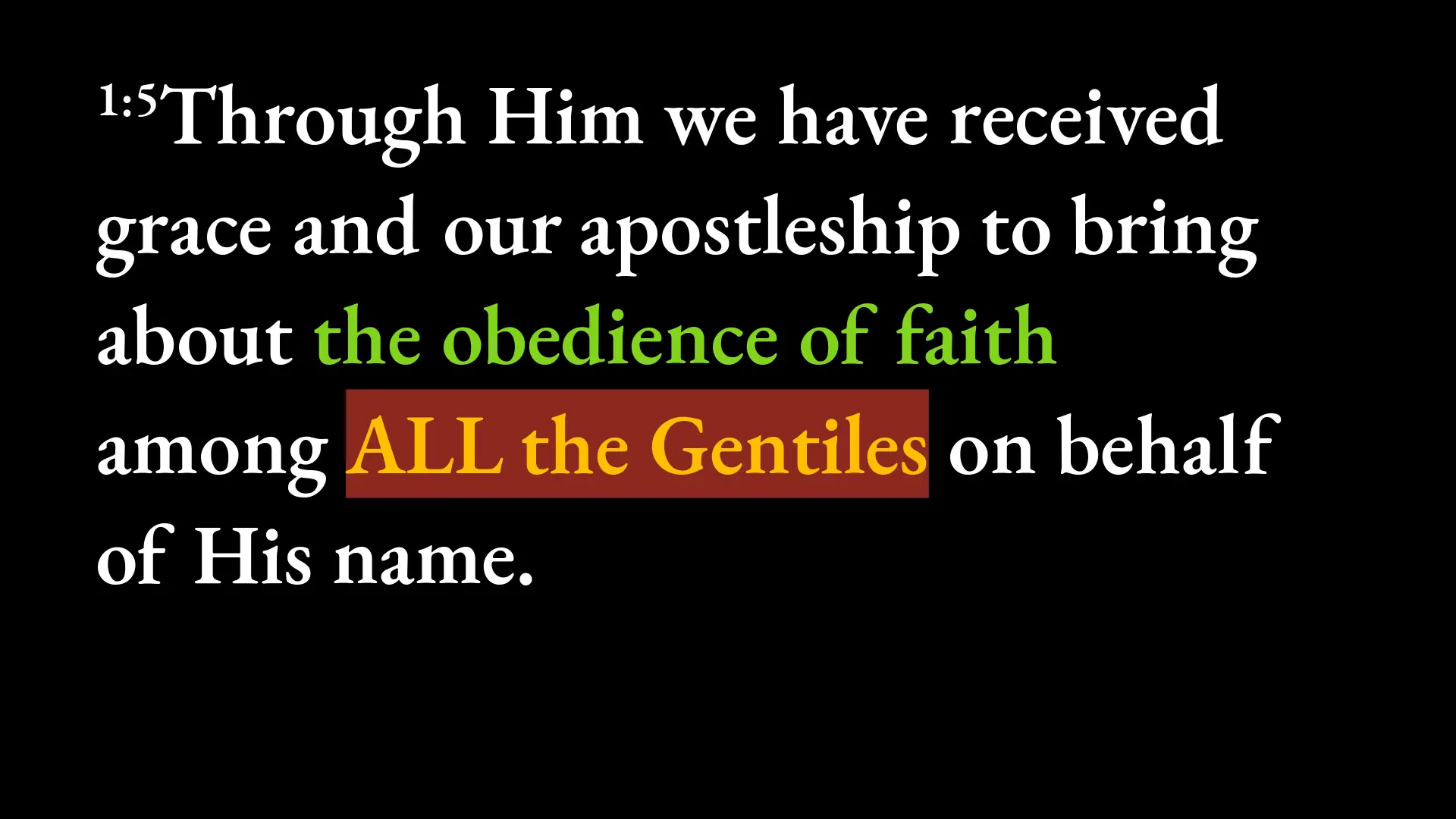
In the same way, if we take the phrase “all Israel” literally, we have to take the phrase “all Gentiles,” too, in a literal sense.
What do we see in Romans 1:5?
1:5 Through him we have received grace and our apostleship to bring about the obedience of faith among all the Gentiles on behalf of his name.
Are we prepared to believe that Paul was called to literally bring all the Gentiles to the obedience of faith. The Gospel is meant for all Gentiles. But did Jesus make Paul an apostle so that he would succeed in bringing all the Gentiles to the obedience of faith?
It does not mean that Paul would succeed in leading ALL Gentile individuals WITHOUT EXCEPTION. It means that Paul was called to preach and convert ALL groups of Gentiles WITHOUT DISTINCTION or discrimination.
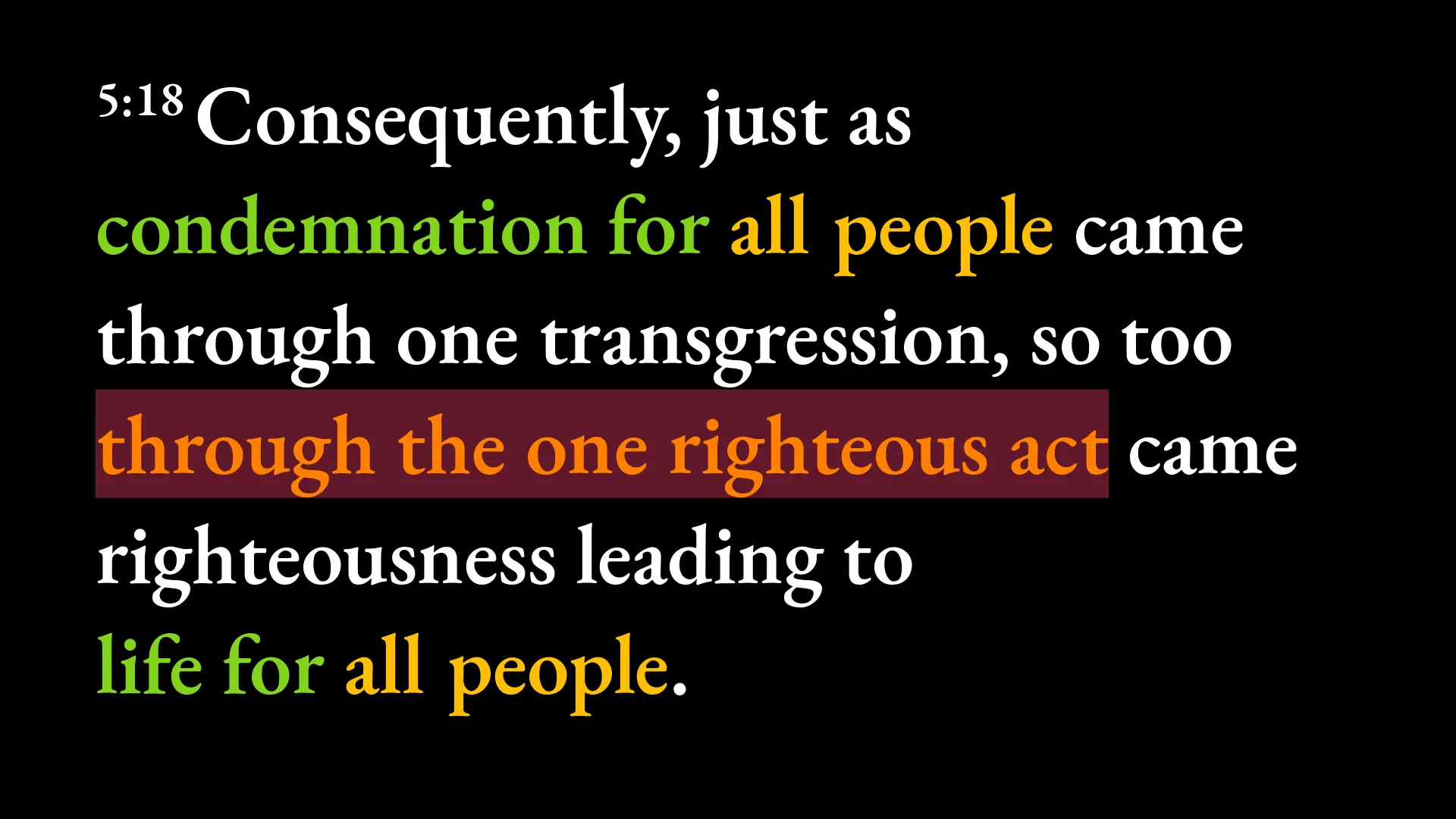
There are Christians who pluck Romans 5:18 out of its context. They say that all people were brought under condemnation through the one transgression of Adam. That is a dangerous conclusion to arrive at after reading just one half of verse. The Bible does not teach that guilt and condemnation can be inherited or passed on to future generations. In fact, an entire chapter – Ezekiel 18 – is devoted to counter such a notion.
If we believe that all people came under condemnation through the transgression of one man, we will have to believe that all people have been brought into eternal life through the obedience of Jesus Christ! Are we prepared to believe that all people everywhere – even without hearing or obeying the Gospel – have automatically inherited eternal life just because Jesus died for them? If we believe such a thing, we will be called universalists. If you take Romans 5:18 in isolation, you will be forced to become a universalist. You can then stop preaching the Gospel.
When it comes to that, we will say, “Jesus’ obedience has potientially brought the whole world to eternal life. Each individual now has to hear the gospel and believe it in order to actualize the benefit of that obedience in his or her own life.” My question is, why don’t you a similar line of reasoning about the first half of the verse? Why don’t you say, “Adam sinned. This led to the whole world to potentially become sinful and condemned. But actually, Adam’s sin led to a chain of events and circumstances that led all people to commit sin. Thus, due to their acts of sin, they too became sinful.”?
We must constantly remind ourselves that we should not jump to conclusions after reading one verse or a sentence in Pauline epistles. Paul did not write slokas or couplets. He wrote lengthy arguments. If we pluck one verse out of its context, we will end up in an awkward situation. This is why I believe that Christians should first learn the basic principles of biblical interpretation before embarking on any serious Bible study.
Paul was familiar with the use of the phrase “all Israel” in the Old Testament. For example,
In Romans 11:26, Paul used the expression “all Israel” in a similar sense. All Isrealites who believe the Gospel will be saved. He does not mean that each individual Jew without exception will be saved.
[When we consider the rest of verse 26 and verse 27, we have to interpret these as eschatalogical events. For an accurate interpretation, we will have to consider these verses in the light of Isaiah 27, Isaiah 59, and Jeremiah 31. But that is beyond the scope of this brief study.]
This is the summary of chapter 11:
Majority of Israelites were cut off from God’s Israel when they rejected Jesus. Their failure and fall triggered God’s mercy towards the Gentiles. And because God showed his mercy to the Gentiles, he decided to show mercy to fallen and hard-hearted Israelites. In this manner, God’s salvation was open to both Gentiles and Jews. God allowed all humanity to sink into a state of helplessness so that He could show His mercy and grace to everyone.
The very though of God’s mercy led Paul to an outburst of praise and worship.
33 O, the depth of the riches
And
the wisdom and knowledge of God!
We cannot search his
judgments,
We cannot fathom his ways.
34For ‘who has known the mind of the
Lord?
Or who has given him counsel?
35Who has given a gift to him
Which
needs to be repaid?’
36For from
him, through him and to him are all things. Glory to him for ever!
Amen.
Our study of the Gospel must lead us to worship. If we don’t get a better glimpse of God’s greatness after all this study, if we are not able to love people of all nations, then our study is useless.
My prayer is that God will open our eyes to see God’s glory and His mercy towards all nations. May we be compassionate to all peoples—not just to a few favorite groups of people. May we be motivated to preach the gospel to the ends of the earth.
Philip Eapen, an environmental scientist by training, devoted his life to proclaim the gospel of Jesus Christ ever since he realized that the world needs Jesus Christ more than anyone or anything else. Apart from sharing the good news of Jesus Christ, Philip teaches Christians in order to equip them for service. He is supported by donations from readers. Philip is married to Dr. Jessimol and they are blessed with three sons and a daughter.
Date: October 15, 2023